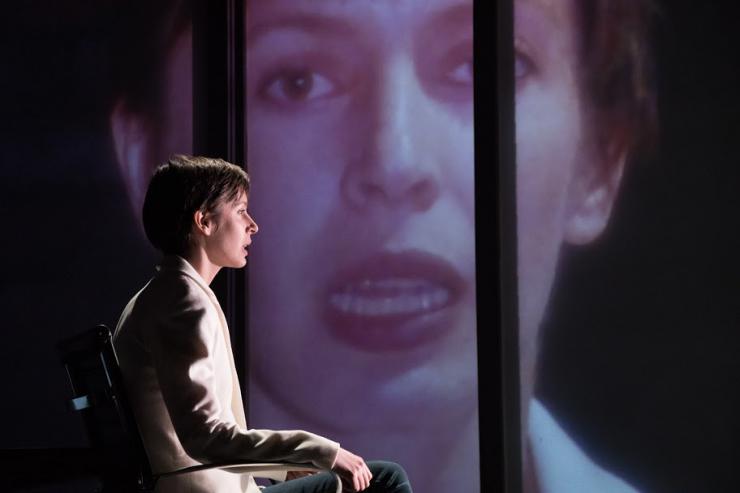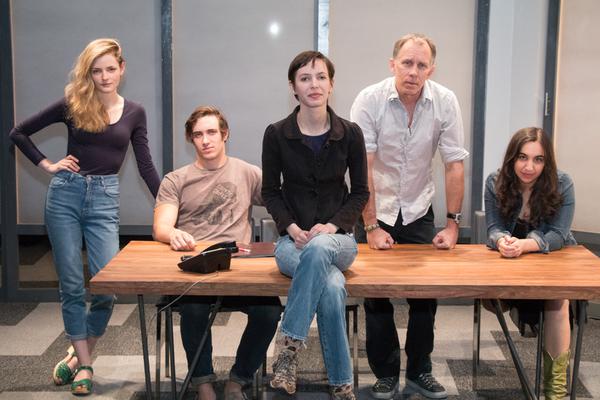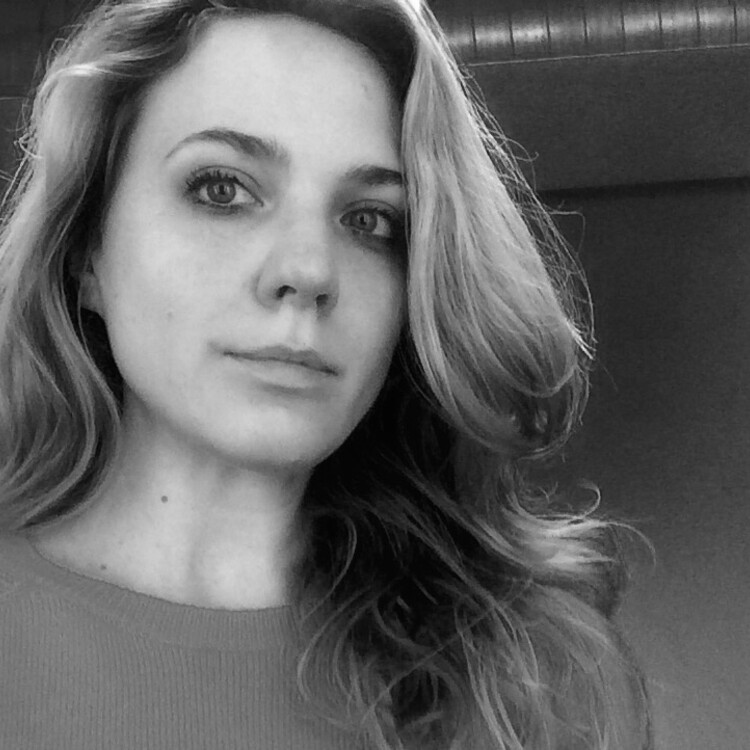Interview with the Muse Project’s Jocelyn Kuritsky
Jocelyn Kuritsky doesn’t think of muses as airy beauties whispering genius into artists’ ears. Her vision involves fellow actresses: empowered women performers helming their own dream projects.
The year-old Muse Project, created by Jocelyn and collaborators, seeks to turn actresses into the leaders of their own theatrical productions by providing them with the resources, network, and essential solidarity needed to leap from brainstorm to stage.
Stet, Muse’s first production that bowed in June 2016 at New York’s Abingdon Theatre Company, emerged from a year of development between playwright Kim Davies, director Tony Speciale, and Jocelyn, who also starred in and produced the show. As a fierce take on the media’s profiteering of campus rape culture, Stet signals there are more bold seasons to come from Jocelyn and crew.
Now Jocelyn looks to Muse Project’s next chapter. She joined me for an afternoon to discuss her project’s aims, the lessons she’s already learned, and how her actor-empowered mission dovetails with Equity’s Fair Wage Onstage campaign.
Women are giving voice to their own disempowerment, their own frustration. I think we’re at a very crucial tipping point of what we feel as representative (of women) and their performance. So I think it’s an incredibly opportune time to experiment.

Sarah Matusek: Thankfully, the push to include more women in theatre has increasingly become a focus for the community nationwide. Given the range of these gender parity initiatives, what does Muse Project offer as distinct to the movement?
Jocelyn Kuritsky: I think a lot of the parity movement, which is fantastic, has been geared at writers. We’re putting the actor front and center. It guarantees a woman’s story...we’re going straight for the bull’s-eye with that.
Sarah: You’ve said it’s discouraging to see actresses you admire not landing as many roles they deserve, or repeatedly landing roles that don’t express the full range of their talent. Was this part of your impetus for starting Muse?
Jocelyn: Definitely. We’re actually working on some statistical research for this. It seems [from] my experience, and the experience of other women who have been in the business as long as I have or longer, there’s a huge drop-off of women colleagues as directors, as writers, and as actresses. There are a lot of people [with whom I acted] in my twenties...who’re not doing this anymore. And that seems strange to me as compared to my colleagues who are men.
We’re trying to figure out how to quantify it, which is shockingly difficult. It’s not like plays where you say, “This was written by a woman and this wasn’t.” We’re looking at the quality of a role, how many roles there are—there are a lot of different factors that come into play. How do you quantify and qualify performance? Kyra Miller is working on defining this, and Julia Jordan, who helped found The Count with Marsha Norman, has been advising Kyra on this.
Sarah: Stet developed out of a collaborative new play process. How do we ensure longevity for new work? How do you imagine Muse’s projects moving forward?
Jocelyn: I have no idea! I think we’ll be finding that out. I have a friend [Sylvia Milo] who did a solo show called The Other Mozart...and she still approaches everything as process. She made this piece, and then she kept putting it out there, and kept putting it out there, and kept putting it out there. And now they tour and she writes, [rewrites] and restages, and brings other women in to perform the play. She can’t be in ten places at once. And that is an extremely attractive model. It’s still very much hers, but it’s expansive. It is important to me in the Muse Project that the process, in essence, belongs to the actor who helped bring it to life.
Very early on in my career I was connected to 13P. I [acted] in two 13P shows back to back, and I got a real strong sense of their purpose. It was a really simple, interesting way to showcase a certain group’s work. I think Muse has a similar intention as well. For me, [13P] was pretty influential as a young actress. The playwrights had so much control. It’s not like I was going through a bunch of producers and casting directors—I was going directly to the artists and they were able to work with me.
Sarah: As a multi-hyphenate, you helped develop Stet’s script, act in it, and produce it. What did you find most challenging about filling all those roles at once?
Jocelyn: What was great about it was what was hard about it. We expedited development and we expedited process with the intention to get something on stage—much in the spirit of 13P! I think [the New York theatre scene] is still very product-focused in a way I’m not sure is always productive. It’s very important to put up imperfect work. I had a slight meltdown at one point, because there was just so much happening. Bruce McKenzie, who played my main co-star [in Stet], said: “You know, you’re not going to figure this out. You’re still going to be figuring this out when we do the last show.” It’s a great reminder.

and Dea Julien. Photo by Ben Strothmann.
Part of what can make you feel like you’re doing a vanity project is that it feels very self-serving, as opposed to serving your community. A good way to combat that is to ask yourself why you want to do it—what do you feel is the benefit to you and others by putting this project up?
Sarah: By bringing actresses to the center of the play-making process to help generate—not just interpret—written roles, do you see that as helping break stereotypical casting?
Jocelyn: Absolutely. I have felt this for a few years, but you really feel it right now with everything happening with the election. Women are giving voice to their own disempowerment, their own frustration. I think we’re at a very crucial tipping point of what we feel as representative [of women] and their performance. So I think it’s an incredibly opportune time to experiment...When we start really charging through [stereotypes], it reveals so much about our culture and social existence. And the best people to ask are the people who live in those bodies.
Sarah: Imagine a performer wants to develop, produce, and star in a show about a character of her own design, but fears it being labeled a vanity project. What words of wisdom would you have for her?
Jocelyn: It may feel like a vanity project. In many ways that’s OK. Part of what can make you feel like you’re doing a vanity project is that it feels very self-serving, as opposed to serving your community. A good way to combat that is to ask yourself why you want to do it—what do you feel is the benefit to you and others by putting this project up? And I think it’s very important to ask for help all the way through. Sometimes you’ll get it and sometimes you won’t, but I think the act of asking really brings people into your process, diluting the vanity project feeling. My feeling is: if you have an itch or an impulse to tell a story or inhabit a character, that impulse isn’t coming out of nowhere—that impulse is coming from something.
Sarah: How does funding figure into the sustainability of Muse Project?
Jocelyn: Right now we’re looking at being very targeted with fundraising for very specific moments in our timeline, especially as we try to figure out what that timeline is. My feeling is that we’re going to try to tap bigger donors from the outset. We’re going to attempt to do that and try to avoid tapping artists for big money because I think it’s very tough for this community. I think [Muse Project] is a feminist cause. It’s literally for telling women’s stories, so I think there are deeper pockets we can look into for that cause in and of itself. That said, we’re right at the beginning, and this stuff is hard and arduous. But we also feel very strongly that we need to pay people.
Sarah: On her first post for Muse’s “I Interview Actresses” blog series, Kyra Miller mentioned that there aren’t many grants available for performers to afford working in projects they’re acting in. It reminds me of a video put out by Fair Wage Onstage where Kathleen Chalfant calls for theatre fundraising to shift its focus to human capital.
Jocelyn: That’s essentially what the Muse Project is. We invest in the actor first. There’s a great article Annie-B Parson wrote called, “This Performance Subsidized by Sweat Equity.” It was written a couple years ago, pre-the Fair Wage Onstage campaign. One of the big problems [in paying actors livable wages] is that no one takes responsibility for this problem. It’s easy to point to other people. And while I do think the Fair Wage Onstage campaign is fantastic and super important, the next step is: how are we going fix this?
Sarah: Because clearly it’s not a matter of whether actors deserve fair wages.
Jocelyn: It’s not just about talent. I don’t even know what talent is...In New York, you basically have a pool of performers who do a lot of research by seeing [shows], communicating with their collaborators, making space and time to contribute their ideas, and then using their mind, body and voice to communicate those ideas to an audience—that is talent. And when people have been doing this for years, that talent grows and accumulates, becoming more complex and intricate. Just like at any job, people gain experience and their talent grows. We should value the accumulation of that experience. And producers should be finding space and ways to compensate that skillset. I tend to think of talent less as something innate, but more as something you develop.
Sarah: As you reflect back on producing Stet, what did you learn from staging such contentious subject matter? Did it defy your expectations for how audiences would receive it?
Jocelyn: I don’t know if I can totally separate it from being a performer because that was such an intricate part of being a producer on it. From the beginning, I knew I wanted an “unlikeable character,” an “unlikeable woman lead.” [Kim Davies, the playwright] questioned the use of the word unlikeable, which I appreciate. [My] character...atwas complicated! And in some ways, that still translates as unlikeable. I think I learned that even in creating a character that was “unlikeable,” as an actor, I strove to make her likeable. It’s like I had an instinct reflex that I had to fight.
Political theatre is really interesting to me. And we abhor it in New York. We skirt it so quickly because we equate political theatre with didacticism, and we want to be cooler than that, right? I’m always looking to play devil’s advocate and I think theatre is inherently moral in a lot of ways. I think we’re always espousing some sort of moral concept, whether we’re overt about it or not. And I wanted [Stet] to play more on the overt side of things. I think it’s very challenging with something like this because you can’t avoid that.
Sarah: Each Muse Project actress will be developing her own show around her own interests, so perhaps not all of Muse’s projects will be so politically charged?
Jocelyn: People are really drawn to saying something about the experience of being a woman. Which is interesting because of where we are in time and space right now; it automatically becomes political. We tend not to see the stories of people of color as just stories. I feel we still culturally see them as having a cause.
It’s asking for a lot of self-awareness. I’m asking for people to be brave. I’m asking people to put themselves out there and deal with backlash if there is backlash. I want to make it OK to fail forward. The idea to do whatever you want feels like, “Oh god, I better make this perfect and amazing, or I’ll miss this opportunity!” But for [Muse], it’s just the beginning of that. It’s asking people to push through that, and make a lot of mistakes. It’s about taking responsibility for your own voice when you’ve been told not to...The secret is: that’s what actors want to do! I think women actors became actors because they have things to say. So what we’re asking goes right to the heart of that.
Since the interview, Actors' Equity Association and the League of Off-Broadway Theatres and Producers have reached an agreement on wage increases for Off-Broadway actors and stage manager.



Comments
The article is just the start of the conversation—we want to know what you think about this subject, too! HowlRound is a space for knowledge-sharing, and we welcome spirited, thoughtful, and on-topic dialogue. Find our full comments policy here